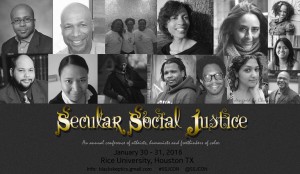Yes, Our Lives Are Intersectional: Reflections on the Secular Social Justice Conference

I had the honor of attending and participating as a speaker at the Secular Social Justice Conference held at Rice University in Houston, Texas, this past weekend. Co-organized by author Dr. Sikivu Hutchinson and Houston Black Nonbelievers leader Donald Wright, the event brought together over 100 humanists and atheists—the majority from black, Latino, feminist, and LGBTQ communities—from across the country. In my ten years as a humanist activist working for the American Humanist Association, I found it to be one of the most enlightening, inspirational, and engaging conferences I’ve ever attended.
I sat on one of the first panels of the conference, “Feminisms of Color and the Secular Movement,” alongside Deanna Adams, who blogs at Musings on a Limb; Heina Dadabhoy, an ex-Muslim activist and Freethought Blogs contributer; AJ Word, founder of the DC-based Secular Sistahs; and Dr. Hutchinson, who moderated the panel.
For many years, the humanist movement has been referred to as “male, pale, and stale,” and leaders have wanted to see changes that reflect the growing diversity of people who identify as humanist, atheist, secular, or as freethinkers. Though it continues to be part of the American Humanist Association’s mission to defend the separation of church and state, criticize dangerous religious ideas, and promote scientific inquiry and reason, it is also our humanistic duty to “aspire to the greater good of humanity” by standing up for marginalized communities and addressing the issues that affect them.
In this context, and as a Filipina raised in a conservative religious tradition, I addressed three primary challenges facing feminists of color in the secular movement: the lack of women of color in leadership positions, the lack of economic justice advocacy as it relates to reproductive access, and the attempt by some to hijack the word “humanist” to replace “feminist.” I also criticized the argument that humanists, by definition, are absolved from ever being racist, sexist, or classist. My fellow panelists echoed similar challenges, mainly the lack of understanding of the concerns of women of color, and provided concrete ways leaders can help overcome these challenges.
Throughout the conference, many shared personal stories of experiencing racism and sexism in the secular movement, addressed concerns about erasure of black and Latino voices in history, emphasized the need to recognize slavery as an injustice that carries repercussions even today, discussed the economic justice needs of immigrants, and many more issues that I don’t often hear at national secular conferences.
It didn’t surprise me that as I live-tweeted so many important words being said and conversations taking place during the conference, we received negative feedback from a small number of our followers on Twitter. But I couldn’t help but feel shocked by the hate behind the words: “I oppose black racism, a topic you cowardly PC f***s refuse to acknowledge.” “People who need safe spaces are cowards.” “There has never been violence or suppression of minorities at [secular] conferences.” I can confidently say that though these people may call themselves humanists, they are not humanists by our definition of the word.
If you were unable to attend the Secular Social Justice Conference, I encourage you to read many of the live-tweets and commentary that took place during the event by following the hashtag #ssjcon on Twitter. Participants and activists such as Sincere Kirabo, Greta Christina, and Deanna Adams will also be writing about their experiences and thoughts on the conference, and I encourage you to read them to learn more about what it means to be involved in social justice work as humanists.
